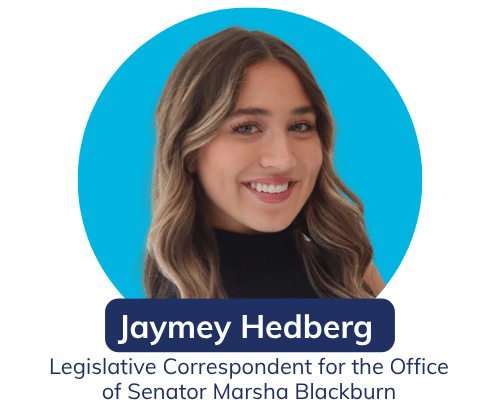Revitalizing Communities and Modernizing Congress: Lessons from a Seasoned Staffer

Can you walk us through your career path and the steps that led you to your current role as a Legislative Director?
I took a non-traditional path to the Hill, and I encourage anyone interested to know there are many ways to get here! After college, drawn to public service, I joined Teach For America in rural Arkansas. I taught art and third grade in the Delta and just recently saw my former students graduate high school.
Afterward, I spent a year in Munich through the Congress-Bundestag Youth Exchange (CBYX) Program and a year in Vienna through Fulbright, working at the intersection of education and policy. Then, I moved to DC as a Teach For America Hill Fellow in Rep. Seth Moulton’s office and knew I wanted to stay. I then became a Legislative Assistant for then Rep. Conor Lamb, who represented my hometown, working there for three and a half years before moving to my current role as Rep. Derek Kilmer’s Legislative Director. I lead his policy team, focusing mainly on appropriations, education, and economic issues, and Congressional modernization and government reform issues.
Which specific policy areas or legislative issues are you most passionate about, and how do you stay informed and engaged in those areas?
I’m especially passionate about government modernization and reform, particularly Congress’s ability to function effectively. Rep. Kilmer chaired the Select Committee on the Modernization of Congress and now serves as Ranking Member of the Modernization Subcommittee and as co-lead of the Fix Congress Caucus. I believe improving Congress generally is fundamental for tackling broader policy issues from the economy to housing, to immigration, to pretty much anything else.
My background also shapes my interest in economic policy. Growing up in a mixed blue-collar and white-collar family and living in the Delta through TFA, I’ve always been passionate about policy issues related to economic mobility—the American dream. This includes workforce development, education, economic development, tax, and financial services issues.
Describe a challenging or rewarding project that significantly influenced your growth as a professional. How did you handle the challenge, and what did you learn from the experience?
The most rewarding project I have worked on was bringing Rep. Kilmer’s doctoral dissertation to help persistently distressed communities recover to life. He was inspired by what happened to the timber industry in the Pacific Northwest, which I understood implicitly, because I grew up in Pittsburgh following the decline of the steel industry.
I helped write and pass legislation attached to the CHIPS & Science Act, that establish the new RECOMPETE program at the Economic Development Administration (EDA). Through the appropriations process, I helped secure $200 million in initial funding for the program too. It has since been named the most applied for national program in EDA’s history—with 565 applications from 49 states. Earlier this summer, $35.6 million was announced for Rep. Kilmer’s district from the program—to revitalize the legacy timber and maritime industries in our district. Persistent distress also characterized the community in the Delta where I did TFA, and I was thrilled to see the community I taught in, also benefit from the program.
What do you believe sets Capitol Hill apart as a unique work environment, and how do you navigate its challenges in your everyday work?
Capitol Hill’s most unique aspect is the opportunity for staffers to identify real problems and solve them through policy. It’s a place for curious people to continue learning about issues that affect Americans’ lives.
The downside is there’s always more work than time or resources, and it’s easy to get caught up in the daily chaos. To manage this, I stay focused on the bigger picture by setting and sticking to legislative goals that align with my boss’s vision, even when unexpected issues arise.
In your role as Legislative Director, strong leadership is essential for keeping the team motivated and focused on the office’s agenda, especially when navigating numerous issues. Could you share some strategies or techniques you employ to inspire and motivate your team, ensuring that everyone remains committed to achieving the office’s objectives despite the challenges they may face?
The best advice I received was to be the kind of manager I’d want to have. My management style is similar to how I approached teaching: be warm and demanding, with clear goals in mind. For our team, this means aligning broader office goals with specific, measurable objectives for each staffer. We set annual goals, which are broken down into quarterly and weekly goals to keep us on track.
I also encourage a mindset of “always be closing” (ABC), which keeps us always on the lookout for ways to move our priorities forward. With Rep. Kilmer retiring, we’re more focused than ever on maximizing our impact in the time we have left.
Leadership often involves guiding and mentoring others. Could you share a specific example of how you’ve supported the professional development of your team members, helping them grow in their roles and excel in their skill sets?
Along with legislative goals, I encourage each team member to set a professional development goal each year. These goals could be anything from improving writing skills to becoming more confident public speakers. I hold weekly check-ins to track progress and provide support.
I also organize group learning opportunities, like workshops on appropriations, House Rules, or strategies to move stalled bills forward. My own mentors on the Hill invested in me early on, and I aim to pay that forward by helping my team grow and succeed.
Word association, what is the first word that comes to mind for each of these?
Policy – Change
Networking – (Be) Targeted
Writing Skills – Essential
Working on the Hill – Impactful
Leadership Connect – Informative
To be featured or learn more, reach out to Gabi Thomas, and spread the word to any colleagues who would be interested.
Be sure to follow the LinkedIn profile for more news and to see who is featured each week!






